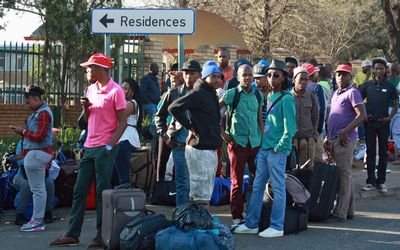DELAYS in registration, along with the late sitting of exams at many tertiary institutions following last year’s student fees protests, has placed student accommodation providers under pressure.
Some providers have missed out on rent for the first and/or second month of the year. This is while the overall bed-shortage grows.
Recent estimates put the shortage at academic institutions at more than 200,000 beds.
The University of Pretoria has an 8,000-bed capacity, of which 2,500 are available for new students. On average, 35,000 students apply for accommodation every year. This mirrors the level of demand at other universities.
Craig McMurray, CEO of Respublica, a student accommodation provider in Gauteng, said providers tried to sign up students as early as possible to lock in income for the year.
"But there have been abnormal delays after the fees protests last year, as exams were written late and many results were released late. This means some companies will receive only nine months of income instead of, say, 10, which can damp profits," he said.
Listed property group Redefine Properties owns 51% of Respublica, which is redeveloping Pretoria’s Hatfield Square into a multi-use precinct, with an emphasis on student accommodation. The project is worth R850m.
Some analysts say property companies should work at satisfying the strong demand for student accommodation. However, student housing is operationally intensive and requires hands-on staff.
But one such company developing student accommodation in various provinces is Stag African, a Cape Town-based specialised housing developer.
MD John Schooling said delays in the roll-out of student accommodation in this academic year had led to other concerns including a possible effect on students’ ability to pass their exams.
"The direct impact and concern is that, beyond having a place to sleep, the shortage of good student accommodation could dramatically impact a student’s ability to study, which in turn could result in an even higher dropout rate and pass rate at the end of the year."
He estimates that about 600,000 students will not have access to good accommodation this year. Mr Schooling said the 200,000 bed shortage at universities was exacerbated when a 400,000 shortfall of beds from technical vocational education and training colleges was added.
The University of Pretoria’s media specialist, Anna-Retha Bouwer said: "Forty percent of residence spaces are reserved for first-year students.
"The remaining capacity is allocated to senior students who qualify for placement, based primarily on their academic performance.
"The demand for residence accommodation far outstrips the available supply, and competition is thus fierce. Academic merit is the primary criterion for placement."

Students at the Vaal University of Technology. Some providers have missed out on rent for the first and/or second month of the year. Picture: SOWETAN
DELAYS in registration, along with the late sitting of exams at many tertiary institutions following last year’s student fees protests, has placed student accommodation providers under pressure.
Some providers have missed out on rent for the first and/or second month of the year. This is while the overall bed-shortage grows.
Recent estimates put the shortage at academic institutions at more than 200,000 beds.
The University of Pretoria has an 8,000-bed capacity, of which 2,500 are available for new students. On average, 35,000 students apply for accommodation every year. This mirrors the level of demand at other universities.
Craig McMurray, CEO of Respublica, a student accommodation provider in Gauteng, said providers tried to sign up students as early as possible to lock in income for the year.
"But there have been abnormal delays after the fees protests last year, as exams were written late and many results were released late. This means some companies will receive only nine months of income instead of, say, 10, which can damp profits," he said.
Listed property group Redefine Properties owns 51% of Respublica, which is redeveloping Pretoria’s Hatfield Square into a multi-use precinct, with an emphasis on student accommodation. The project is worth R850m.
Some analysts say property companies should work at satisfying the strong demand for student accommodation. However, student housing is operationally intensive and requires hands-on staff.
But one such company developing student accommodation in various provinces is Stag African, a Cape Town-based specialised housing developer.
MD John Schooling said delays in the roll-out of student accommodation in this academic year had led to other concerns including a possible effect on students’ ability to pass their exams.
"The direct impact and concern is that, beyond having a place to sleep, the shortage of good student accommodation could dramatically impact a student’s ability to study, which in turn could result in an even higher dropout rate and pass rate at the end of the year."
He estimates that about 600,000 students will not have access to good accommodation this year. Mr Schooling said the 200,000 bed shortage at universities was exacerbated when a 400,000 shortfall of beds from technical vocational education and training colleges was added.
The University of Pretoria’s media specialist, Anna-Retha Bouwer said: "Forty percent of residence spaces are reserved for first-year students.
"The remaining capacity is allocated to senior students who qualify for placement, based primarily on their academic performance.
"The demand for residence accommodation far outstrips the available supply, and competition is thus fierce. Academic merit is the primary criterion for placement."



















Change: -0.97%
Change: -0.99%
Change: -0.84%
Change: -1.10%
Change: -0.61%
Data supplied by Profile Data
Change: 0.09%
Change: -1.10%
Change: -1.06%
Change: 0.00%
Change: -1.42%
Data supplied by Profile Data
Change: -0.14%
Change: 0.20%
Change: 0.02%
Change: 0.50%
Change: -0.57%
Data supplied by Profile Data
Change: 0.08%
Change: 0.00%
Change: 0.26%
Change: -0.58%
Change: 0.66%
Data supplied by Profile Data